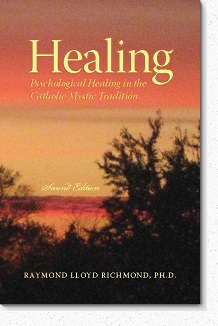|
|
|
Psychological
Healing
in the Catholic Mystic Tradition

Outside
the Box

In
everything you do . . .
prove yourselves innocent and straightforward,
children of God beyond reproach
in the midst of a twisted and depraved generation—
among whom you should shine like the stars of the sky. |
—see Philippians
2: 14–15 14–15
|
Catholic Psychotherapy |
Spiritual Counsels |
Books |
About CSF
The Nine Dot Puzzle |
The Real Box: Fraud and Games |
Contempt of the World |
Detachment from the World: Chastity, Modesty,
and Humility |
Summary
 ANY
years ago, especially in the 1960s,
the Nine Dot Puzzle was popular in business circles for teaching a
concept of creative thinking. The idea was that creativity could be enhanced
if one were to step “outside” self-imposed presumptions of
reality. ANY
years ago, especially in the 1960s,
the Nine Dot Puzzle was popular in business circles for teaching a
concept of creative thinking. The idea was that creativity could be enhanced
if one were to step “outside” self-imposed presumptions of
reality.
The puzzle consisted of nine
dots arranged in a square with the challenge to connect all the dots with
four straight, continuous lines, never lifting the pencil from the
paper.

If you have never
seen this puzzle before, consider it carefully before viewing the solution
below.
V
V
V
|
The solution depends on drawing
some of those lines outside the “box” defined by the nine dots
themselves.

The Real
Box
Although the Nine Dot Puzzle
is just an intellectual puzzle, it symbolizes a deep psychological desire.
So what might this desire be? What is the real box that we yearn to
escape?
Well, that box is the
“box” of creation fallen away from God and into
sin.
And our dilemma is that, while
we are bounded by this box, we cannot see out of it. We cannot pierce the
veil of sin with science, technology, philosophy, or
spirituality. No human effort can open the eyes of
our own spiritual blindness.
While in the box we feel ignored,
undervalued, and underprivileged. While in the box we are helpless,
wretched creatures grasping for any
illusion of power and control. While in the
box we are enslaved to its fraud.
So what can we do? How can we
find truth? How can we see God?

|
Whoever has seen
Me has seen the Father. |
|
|
—John 14:9 |
|
Our only hope is Christ. To see
Christ is not only to see the Father, but it is also to recognize the fraud
of the world that enslaves us.
Fraud
Jacques
Lacan, a brilliant French psychoanalyst, taught that, in psychological
terms,
 the social world is a fraud. In so far as the social
world around us places constant demands upon us as individuals, Lacan called
the social world “the Other,” and he expressed the truth of social
fraud with a profound saying: “There is no Other of the
Other.” [1]
By this he meant that all of the meaning we attribute to our human creations,
including language itself, has no value beyond its own limited
self-reference. the social world is a fraud. In so far as the social
world around us places constant demands upon us as individuals, Lacan called
the social world “the Other,” and he expressed the truth of social
fraud with a profound saying: “There is no Other of the
Other.” [1]
By this he meant that all of the meaning we attribute to our human creations,
including language itself, has no value beyond its own limited
self-reference.
Interestingly
enough, Genesis 2:19-20 essentially says the same thing when it tells the
story about God bringing the “various wild animals and various birds
of the air” to the man “to see what he would call them.” Note
that God didn’t name the animals; He simply said that “whatever
the man called each of them would be its name.” Here God gave the man
the freedom to create language, a language guaranteed only by its own
enunciation.
Now, although
Genesis speaks from the revealed religion of the Jewish tradition, and though
Lacan was not
religious [2]
and spoke from the position of secular psychology, the essential point should
be clear: no language—indeed, no human creation—has any absolute
meaning.
|
The world offers
itself to us in full spectacle, but there is nothing to see, really, except
deluded celebrities gloating in the fraud of
self-importance.[3]
Thus we have a world filled with |
|
|
• |
Advertising and
entertainment industries that mesmerize us and our children into the deepest
levels of self-deception, all in the guise of making us “feel good” while we
ignore human dignity. |
|
|
• |
“Progressive”
politicians don’t and can’t fulfill their empty promises of “hope” but instead
lead us into a corrupt wasteland of self-gratification. |
|
|
• |
Educational systems
forsake education for politically-correct brainwashing. |
|
|
• |
Health care
systems manipulate our bodies with medications and technology and defile
our dignity and our souls in the process. |
|
|
• |
“News”
media forsake the noble ideal of objective reporting and brazenly distribute
biased social propaganda. |
|
|
• |
Parents who
don’t know how to parent and don’t even care that they don’t
know. |
|
|
• |
Political activists
use intolerance and bullying of others to demand tolerance for their own
agenda. |
|
|
• |
And, yes, bishops,
priests, deacons, and religious who refuse to defend the true faith but instead
stay within the box of social fraud, playing its games to protect their own
pride and to seek their own social status. |
|
Games
In the pure sense of the
word, a “game” refers to a process of social interaction that depends
on procedural rules to ensure that all participants know what to expect of
each other. If you were playing chess and your opponent suddenly pulled out
a gun and shot you, you would be at a clear disadvantage.
Therefore, because any participant
interested only in the acquisition of power will dominate the others, games
require rules of conduct to provide a certain fairness, so that true expertise,
rather than raw force, should decide the outcome.
Accordingly,
politics is a game. Business is a game.
Warfare is a game. And, like it or not, even
romance is a game; that is, because romance is not
based in true love, romance is, in technical psychological
terms, a game, and to play this game you must make yourself into an
object and put yourself in competition
with everyone else playing the same game.
In fact, everything within the
box of social fraud is a game. Even those persons who can recognize the fraud
around them and want to throw a wrench into the works—like political
activists—are still playing a game.
There is no escape from fraud
and game-playing by playing the game.
There is only one true escape:
to stop playing the game and step outside the box. To understand what this entails,
let’s begin with a concept that, in Latin, is called Contemptus
Mundi.
Contempt of the
World
Contemptus mundi, or
“contempt of the world,” is not, as some people would say today,
an outdated medieval concept.
|
• |
Contemptus mundi
does not mean to have disdain for sunrises and sunsets and swallows rollicking
in the evening sky. |
|
|
• |
Contemptus mundi
does not mean contempt for natural beauty. |
|
|
• |
Nor does contemptus
mundi mean to nurture disgust and hatred for anything. |
|
So why does Christian
“contempt“ for the world have nothing to do with hatred? Well,
Christianity is based in love, and to understand love we must be clear about
the following:
|
• |
Love has nothing
to do with hatred for evil. |
|
|
• |
Love has nothing
to do with fighting Satan and his agents with
human power. |
|
|
• |
Love has nothing
to do with trying to avoid hell. |
|
Love, however, has everything
to do with the desire for the good.
Contemptus mundi, therefore,
is the Christian rejection of the world—the human social world, in all
its vanity—and its futile attempt to hide from
God and from His true love. Contemptus mundi is loving refusal to
condone or participate in the world’s sins.
|
Likewise, the
concept of contempt for the self (especially
as used by Thomas à Kempis and Saint John of the Cross) does not mean
self-loathing or self-condemnation, nor does
it lead to self-punishment. It really means to
set aside your self-interests so that you have the time and the inclination
to pray for others and be a personal example to them, all in the interest
of their spiritual good, and yet to develop your own
talents as fully as possible, in spiritually healthy
self-love, so that your growth might ultimately
benefit the growth of others. |
|
If you don’t grasp this point right at the beginning of your
spiritual quest, how will you ever make any spiritual
progress? How will you ever fulfill the command of Christ to
pray constantly (Luke 18:1), for example? How
can you pray constantly when your head is filled with the world and all its
cell phones, video games, television shows, movies, music, sports events,
shopping, drugs, alcohol, and erotic
activities [4]?
|
He said to them
again, “I am going away and you will look for Me, but you will die in
your sin. Where I am going you cannot come.”
So the Jews said,
“He is not going to kill Himself, is He, because He said, ‘Where
I am going you cannot come’?”
He said to them,
“You belong to this world, but I do not belong to this world. That is
why I told you that you will die in your sins.” |
|
|
—John 8:21–24 |
|
Detachment from
the World
To step outside the box of social
fraud, therefore, requires detachment from the human world in all its vanity.
Accordingly, detachment from the world shouldn’t be considered
as a spiritual work in the negative sense—that is, as whatever
you do to avoid something. Instead, it should be considered in the
positive sense as whatever you do to achieve something
good.
|
Consider that
Christ
emptied [5]
Himself to come into the world—right into the midst of our
wretchedness and pain—to free us from our
enslavement to sin. Therefore, those who call themselves
Christian should be willing to empty themselves of their
pride of self and to enter into the pain of others,
so that, through sacrifice and prayer, others
might be healed from their sins. |
|
Now, detachment from the
world has several practical aspects: chastity, modesty, and
humility.
Chastity
As the full human response to
divine love, chastity encompasses all the
psychological, social, and physical consequences of accepting that the body
is the temple of the Holy Spirit (1 Corinthians
6:19) and in therefore distancing ourselves
from—or, in scriptural language, dying to—the
corrupt social world in which we all live, to prepare
ourselves for holy service in the Kingdom of Heaven.
|
Chastity is not
the repression of sexuality, it is the purifying transformation of
desire into
love.
If you take the
TWELVE
FRUITS
of the Holy Spirit—Charity, Joy, Peace, Patience, Longanimity (forbearance),
Goodness, Benignity (kindness), Mildness, Fidelity, Modesty, Continence,
and Chastity—and mix them together, you get a fruit salad called mutual
cooperation. Mutual cooperation is the essence of Christian life. And
chastity is a core ingredient in that recipe. You simply cannot have mutual
cooperation if you are always making others into
objects for your personal pleasure. |
|
In a practical sense,
chastity refers to abstinence from all sexual activity which is not
open to procreation between a man and a woman within the indissoluble bond
of Holy Matrimony. In other words, if you are living in the man-woman
bond of Holy Matrimony, to live a holy
lifestyle it is necessary to abstain from
all sexual activity that is not ordered to
procreation. If you’re not living
in the man-woman bond of Holy Matrimony, to live a holy
lifestyle it is necessary to abstain from
all sexual activity.
 F YOU STAY within the box,
you will be enslaved to the exuberant fantasy that your aching throb of
loneliness might be alleviated through someone’s body. But outside the
box, in Christ, you can be for others a soul enrobed in chaste beauty, and
you will be filled with all the fullness of real love. F YOU STAY within the box,
you will be enslaved to the exuberant fantasy that your aching throb of
loneliness might be alleviated through someone’s body. But outside the
box, in Christ, you can be for others a soul enrobed in chaste beauty, and
you will be filled with all the fullness of real love.
Modesty
Our bodies are meant to
be chaste and modest temples of the Holy Spirit so that we can relate to
others through our hearts with true love. Our bodies are not meant
to be covered with the graffiti of tattoos (Leviticus 19:28), or made into
works of “art” with fashionable costumes, piercings, hair dye,
gaudy make up, shaven heads, or hostile punk hair styles. Our bodies are
not meant to be defiled by making our reproductive organs into the equipment
of a recreational sport. Nor are our bodies meant to be made into instruments
of social acceptance, expressions of vanity and
pride, or provocations to
lust.
|
The Blessed Virgin
herself is the model for all feminine modesty and
humility. Because of her purity and humility,
Mary was chosen to bear Our Lord, and, because of her love for the Divinity
she carried within her, she maintained a demeanor of modesty for the rest
of her life.
In a similar
way, every Christian woman is called to see herself as a vessel of grace,
treating with respectful humility the vessel of her reproductive
functioning—which, being given by God the Father, is not something she
possesses—and protecting the vessel of her entire body with the cloak
of modesty. |
|
Modest clothing, therefore, should
cover the body with dignity rather than put it on display as an object. In
this context, clothing can be immodest either because it is tight-fitting
or because it exposes bare flesh. For women especially, tight-fitting clothing
(including internationally ubiquitous blue jeans, T-shirts, and tank tops,
along with athletic wear and swim “suits”), shorts, short skirts,
low necklines, and bare shoulders serve one unspoken purpose: to incite
lust. Just because certain styles of clothing (or lack of clothing) may
be socially accepted does not prevent them from being “weapons for
wickedness”—sins of pride and lust, and grave offenses to the very
holiness we pledged to seek and defend in our baptismal
vows.
|
Sin must not
reign over your mortal bodies so that you obey their desires. And do not
present the parts of your bodies to sin as weapons for
wickedness, but present yourselves to God as raised from the dead to
life and the parts of your bodies to God as weapons for
righteousness. |
|
|
— Romans 6:12–13 |
Endeavor, then, to develop a
“modesty of the eye” that does not seek to be “seen”
in the world or to “see” others as mere
objects for your own pleasure.
 F YOU STAY within the box,
your life will be enslaved to lust and to the manipulation of others for
your own pleasure, status, and power. But outside the box, in Christ, you
will find the ability to soul for other
souls [6]
in righteousness. F YOU STAY within the box,
your life will be enslaved to lust and to the manipulation of others for
your own pleasure, status, and power. But outside the box, in Christ, you
will find the ability to soul for other
souls [6]
in righteousness.
Humility
Encompassed within the virtue
of humility are three different graces that allow you to live a genuine
Christian life. These are the graces
|
• |
to set aside your
attempts to make yourself feel “special” through the acceptance
and admiration of others; |
|
|
• |
to overcome your
repugnance to feeling emotionally hurt by
others; |
|
|
• |
to seek the good
of others in all things, setting aside all
competition, even at your own expense. |
|
Still, let’s be careful
that this is done in a psychologically healthy manner.
First, it’s good when our
work is recognized and appreciated; the spiritual point is that we
shouldn’t crave this admiration as an aspect of a personal
identity,
but that we endeavor to accept all benefits
of our work in praise of Christ, who emptied Himself for our sake, who suffered
for us, who died on a cross for us, and in whose service we do our work.
But may I never boast except in the cross of our Lord Jesus Christ
(Galatians 6:14).
Second, we all feel
hurt when someone
insults us;
still, the spiritual point is that we
don’t need to build up psychological
defenses to protect ourselves from the pain of being insulted if only,
even in our deepest hurt, we always endeavor to trust in Christ, who alone
will protect us from all danger. Be not
afraid, as Jesus says repetitively throughout
the Gospels.
Finally, although “placing
others first” runs counter to natural self-preservation, the spiritual
point is that, if we really trust in God, not only can we stop
competing with others to satisfy our
pride but also we can endeavor to notice the needs
of others, looking on others with compassion,
in the hope that they might be saved from damnation
because of their own desperate obsession with self-preservation. Nevertheless,
our concern for others must not take on a form of
masochism or self-defilement; in all of our charity
to others we must never relinquish the
responsibility of developing our talents to the
fullest, so that we can serve Christ effectively and
joyfully, in pure
love.
 |
To be taken with
love for a soul, God does not look on its greatness, but on the greatness
of its humility. |
—St. John of the Cross
The
Sayings of Light and Love, 103 |
 F YOU STAY within the box,
your life will be enslaved to pride and to the unremitting defense of your
own ego. But outside the box, in Christ, you will find true peace in service
to others. F YOU STAY within the box,
your life will be enslaved to pride and to the unremitting defense of your
own ego. But outside the box, in Christ, you will find true peace in service
to others.
Summary
What a waste to stay in the box
and play the games that the world plays in its spiritual blindness and ignorance
of sin! What a waste to cling to your “self”
and its attachments to the world! What a waste to refuse to empty your
“self” in Christ! What a waste to renounce the Cross by filling
yourself with the world’s frivolity and
vanity, thus joining a God-forsaking culture in
hiding its pain behind
illusions where truth can never
reach!

Notes.
1. Lacan, Jacques. “The subversion of the
subject and the dialectic of desire in the Freudian unconscious.” In
Écrits: A selection (Alan Sheridan, Trans.). New York: W. W.
Norton, 1977, pp. 310-311:
“Any statement of authority has
no other guarantee than its very enunciation, and it is pointless for it
to seek it in another signifier, which could not appear outside this locus
in any way. Which is what I mean when I say that no metalanguage can be spoken,
or, more aphoristically, that there is no Other of the
Other.”
2. Lacan, at least, did not attempt to subvert
religion like Freud, nor did he try to “psychologize” religion
like Jung and Rank. Lacan simply respected the fact that psychoanalysis could
say nothing meaningful about religion. See “The subversion of
the subject and the dialectic of desire in the Freudian unconscious.”
In Écrits: A selection (Alan Sheridan, Trans.). New York: W.
W. Norton, 1977, p. 316:
“We [psychoanalysts] are answerable
to no ultimate truth; we are neither for nor against any particular
religion.”
3. See Hans Christian Andersen’s tale,
The Emperor’s New Clothes.
4. Eroticism is not love,
it’s desire, pure and simple. If it were
love, we wouldn’t have AIDS and venereal diseases,
would we? Even in Holy Matrimony sexual activity between a man and a woman
is more often than not just a form of desire—what John the Evangelist
calls “sensual lust.” Nevertheless, in true
matrimony a man and a woman can raise their sexual
activity to the level of the holy when sexual union ratifies their mutual
desire for mystical union with God.
5. “Though He was in the form of God, Jesus
did not deem equality with God something to be grasped at. Rather, He emptied
Himself and took the form of a slave, being born in the likeness of men”
(Philippians 2:6-7). The Greek word translated here as “empty”
is kenosis, a great mystery that illustrates the process of divine
love seen not just in the Incarnation but also in the giving of the Holy
Spirit. And, behind all of this, stands God’s emptying of Himself in
His act of creation, a pure act of love.
6. Jacques Lacan, “God and the
Jouissance of
 Woman.”
In Mitchell, J. & Rose, J. (Eds.), Feminine Sexuality: Jacques Lacan
and the école freudienne. (New York: W. W. Norton, 1985). See
p. 155: Woman.”
In Mitchell, J. & Rose, J. (Eds.), Feminine Sexuality: Jacques Lacan
and the école freudienne. (New York: W. W. Norton, 1985). See
p. 155:
“In effect, as long as soul souls
for soul there is no sex in the affair.”
Recommended
Reading
A treasure of a resource for psychological and spiritual healing. Information
gathered from my websites (including this webpage) is now available at your fingertips
in book form.
 |
 |
Healing by Raymond Lloyd Richmond, Ph.D. explains how psychological
defenses help to protect us from emotional injury. But if you cling to the
defense mechanisms that were created in your childhood and carry them on
into adulthood—as most everyone does unconsciously—your quest for spiritual
healing will be thwarted by overwhelming resentments and conflicts. Still, God
has been trying to show you that there is more to life than resentment and
conflict, something so beautiful and desirable that only one thing can resist its
pull: hate So now, and in every moment until you die, you will have a profound choice
between your enslavement to old defenses and the beauty of God. That decision has to
come from you. You will go where you desire.
Ordering
Information |
|
|







 the social world is a fraud. In so far as the social
world around us places constant demands upon us as individuals, Lacan called
the social world “the Other,” and he expressed the truth of social
fraud with a profound saying: “There is no Other of the
Other.” [
the social world is a fraud. In so far as the social
world around us places constant demands upon us as individuals, Lacan called
the social world “the Other,” and he expressed the truth of social
fraud with a profound saying: “There is no Other of the
Other.” [
